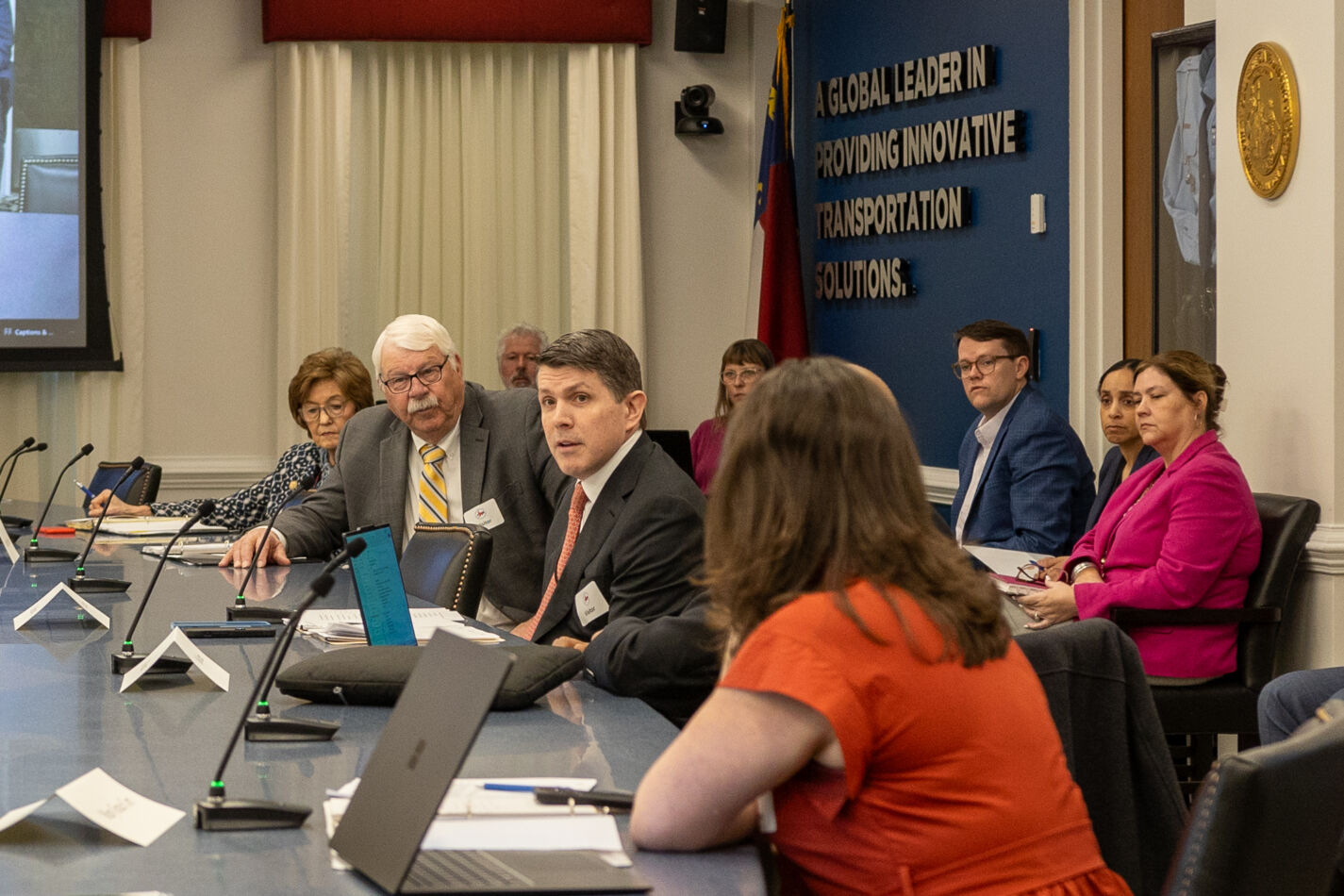Singleton, DHHS pitch CON arguments to three-judge panel

A New Bern eye surgeon and the North Carolina Department of Health and Human Services offered contrasting arguments about the state’s certificate-of-need law in court filings Wednesday. A challenge to the CON law heads before a three-judge trial court panel on Nov. 18.
Dr. Jay Singleton argues that the state’s CON requirements violate his state constitutional rights by limiting his ability to perform most eye surgeries at his New Bern vision center. DHHS is defending the CON law against Singleton’s complaint.
A unanimous state Supreme Court ruled in October 2024 that Singleton could move forward with his lawsuit. That decision reversed lower courts that had ruled against Singleton.
“North Carolina’s certificate of need (CON) law bans healthcare providers from entering the market without a CON,” Singleton’s lawyers wrote in their latest brief. “Unlike a professional or facility license, a CON does not regulate health or safety. Instead, whether a provider can obtain a CON turns entirely on whether a state agency projects a ‘need’ for more services — a decision that depends, at root, on whether there are already providers serving that region.”
“Put differently: Whether a new provider can enter the market depends on whether old providers got there first,” the brief continued. “Plaintiff Dr. Singleton is a case in point. He wants to perform surgeries in his own operating room at far better prices than those offered at the only other nearby option: CarolinaEast hospital. But the CON law bans Plaintiff from doing that — precisely because CarolinaEast got there first and the state has never declared a ‘need’ for new services.”
“Art. I, §§ 32 and 34 of the North Carolina Constitution forbid ‘exclusive privileges’ and ‘monopolies,’” Singleton’s lawyers wrote. “This motion presents a pure legal question: Does the CON law grant these forbidden things? The law’s predecessor did, and that’s why it was struck down [in 1973]. Today’s CON law works the same way and it thus deserves the same fate. In the end, whatever one thinks of the CON law as a policy matter, there are simply some lines the legislature can’t cross.”
“The CON law crosses lines drawn by the plain text of Art. I, §§ 32 and 34. Both provisions forbid the state from granting exclusive rights to provide private services,” the court filing continued.
“Courts have a duty to eliminate threats to state constitutional rights,” Singleton’s lawyers added. “There is only one way to eliminate the threat here: Declare the CON law facially unconstitutional and enjoin its enforcement.”
North Carolina is one of 35 states with a CON law, responded lawyers from the NC Department of Justice. They represent DHHS, which oversees the CON program.
“Contrary to Plaintiffs’ claims that the CON Law is a relic of the past that has no relevance today, the General Assembly has consistently revisited the law’s provisions and has routinely amended the law since its enactment,” according to the state’s brief.
State courts upheld the current CON law as constitutional in a 2010 case, Hope—A Women’s Cancer Center v State. “Here, Plaintiffs repeat the same arguments that Hope rejected, but Plaintiffs confront an even higher bar by alleging the CON Law is unconstitutional on its face,” DHHS’ lawyers wrote. “In Hope, the North Carolina Court of Appeals held that the CON Law rests squarely within the ordinary police powers of the General Assembly. The Court upheld the constitutionality of the law, explaining how it furthers the government’s interest in protecting public health.”
“Couched in speculative assumptions, all of Plaintiffs’ claims challenge the CON Law as a matter of policy,” the brief continued. “Because Hope still controls, and because Plaintiffs have not shown that the CON Law is facially unconstitutional in any event, Plaintiffs’ claims fail as a matter of law and should be dismissed.”
Atrium Health, Cape Fear Valley Health System, North Carolina Healthcare Association, North Carolina Health Care Facilities Association, Association for Home and Hospice Care of North Carolina, North Carolina Senior Living Association, and Bio-Medical Applications of North Carolina Inc. all backed a friend-of-the-court brief supporting the CON law.
“The General Assembly found that the CON Law is necessary to improve health care quality and access while decreasing costs,” the health care providers’ lawyers wrote. “Plaintiffs seek to have the entire CON Law declared unconstitutional based on speculative and unsupported assumptions that they could not obtain a CON for an ambulatory surgical facility in Craven County.”
“Plaintiffs’ claims are doomed,” the brief continued. “Binding precedent has already upheld the CON law’s constitutionality. … The CON law serves a legitimate government interest and is consistent with the North Carolina Constitution.”
Responses to the initial briefs and proposed court orders are due Nov. 5.
Judges Jeffery Foster of Pitt County, Jacqueline Grant of Buncombe County, and Troy Stafford of Iredell County will hear oral arguments in Singleton’s case next month. Foster and Stafford are Republicans. Grant is a Democrat. Supreme Court Chief Justice Paul Newby, a Republican, appointed the panel.
Singleton filed a motion on Aug. 25 for partial summary judgment in the case.
“The CON law violates Art. I, § 32 of the North Carolina Constitution on its face because it grants ‘exclusive or separate emoluments or privileges’ not ‘in consideration of public services,’” wrote Singleton’s lawyers, led by representatives of the Institute for Justice.
“The CON law violates Art. I, § 34 of the North Carolina Constitution on its face because it grants ‘monopolies,’ which ‘are contrary to the genius of a free state and shall not be allowed,’” the motion added.
Singleton’s “facial claims under Art. I, §§ 32 and 34 present purely legal questions about which there can be no material factual disputes,” his lawyers wrote. “Because the CON law violates Art. I, §§ 32 and 34 as a matter of law, summary judgment is proper.”
The court filing reserved Singleton’s right to argue at a future date that the CON law is unconstitutional “as applied” to the particular facts of his case. An as-applied challenge would proceed before a single trial judge.
The state Supreme Court’s October 2024 decision revived Singleton’s complaint that state government violates his constitutional rights by blocking him from performing most eye surgeries at his own facility.
In an unsigned unanimous four-page opinion, the court directed the case back to a trial court.
At the trial level, justices said the court must take into account two recent unanimous state Supreme Court decisions. One dealt with claims that Kinston engaged in racial discrimination when choosing which city properties to condemn. The other involved Ace Speedway’s claim that state officials violated the Alamance County racetrack owners’ rights when targeting the track for a shutdown during the COVID-19 pandemic.
“This decision clears the way for the trial court to resolve the central issue in this case: Does the CON law violate the North Carolina Constitution’s law of the land, anti-monopoly, and exclusive-privilege clauses?” wrote Joshua Windham of the Institute for Justice in an email to Carolina Journal when the Supreme Court issued its ruling. IJ lawyers represent Singleton.
“The lower courts dismissed this case on two mistaken premises: (1) that the state Supreme Court’s 1973 decision in Aston Park — which struck down the state’s prior CON law under the same three provisions we’re citing here — was ‘moot,’ and (2) that Dr. Singleton was required to apply for a (nonexistent) CON before he could challenge the constitutionality of the CON law,” Windham added.
Health care providers must secure a CON from state government before building or expanding facilities or purchasing more expensive medical equipment.
Singleton argues that North Carolina’s CON regime forces him to direct his patients to a nearby hospital, CarolinaEast, for most surgeries. The hospital holds the region’s only CON. Singleton says that arrangement proves more expensive and less convenient for patients.
“Plaintiffs brought claims alleging that the Certificate of Need law violates their rights under the Monopolies Clause, Exclusive Emoluments Clause, and Law of the Land Clause of the North Carolina Constitution,” according to the state Supreme Court opinion. “Plaintiffs described their constitutional claims as ‘as-applied’ challenges in the complaint. Both the trial court and the Court of Appeals accepted plaintiffs’ characterization of these claims and evaluated the claims as as-applied challenges.”
“[W]e conclude that plaintiffs’ complaint asserts both facial and as-applied challenges,” Supreme Court justices wrote.
A facial constitutional challenge targets a law in its entirety. The plaintiff asserts that there is no circumstance in which a court could uphold the law as constitutional. An as-applied challenge asserts only that the targeted law is unconstitutional when considering the facts of a particular plaintiff’s complaint.
“Here, plaintiffs’ complaint alleges facts that could undermine the Certificate of Need law’s constitutionality far beyond the particular circumstances of these plaintiffs,” according to the Supreme Court opinion. “Indeed, in their supplemental briefing, plaintiffs acknowledge that, should they prevail, the ‘need for relief that extends beyond [plaintiffs] will likely arise here’ and ‘will likely entail facial relief.’”
“We agree. The complaint contains allegations that, if proven, could render the Certificate of Need law unconstitutional in all its applications,” Supreme Court justices wrote.
Labeling the case both a facial and as-applied challenge is a “crucial determination,” justices wrote. State law requires facial challenges to go before a three-judge Superior Court panel. Singleton had argued his case initially before a single trial judge.
“Because the trial court and the Court of Appeals mistakenly treated plaintiffs’ claims exclusively as as-applied challenges, we vacate the decision of the Court of Appeals and remand this matter to the Court of Appeals with instructions to vacate the trial court’s judgment and remand for further proceedings,” Supreme Court justices ordered.
“Because we vacate the decision of the Court of Appeals on this basis, we need not address plaintiffs’ challenges to that decision asserted in the briefing before this Court,” Supreme Court justices added. “However, for the benefit of the trial court on remand, we disavow the Court of Appeals’ jurisdictional analysis concerning the exhaustion of administrative remedies and direct the trial court to this Court’s recent decisions in Askew v. City of Kinston … and Kinsley v. Ace Speedway Racing, Ltd.”
Singleton cited the Ace Speedway ruling in a September 2024 filing with the state Supreme Court. His lawyers wrote that the Ace Speedway ruling served as an “additional authority” supporting the surgeon’s legal arguments.
“The court’s decision in Kinsley reaffirms that in North Carolina, economic liberty matters,” Windham told CJ. “The court held that when the state restricts our right to earn a living, we can use evidence, under the fruits of their labor clause, to show the restriction is not ‘reasonably necessary’ to protect the public. That’s exactly the same test the court applied in 1973 when it struck down the state’s first certificate of need law under the law of the land clause.”
“Why does that matter? It means that courts can’t dismiss challenges to economic laws just because government lawyers utter the words ‘public health,’” Windham said. “It means that the state’s supposed reasons for destroying your business aren’t gospel; you can challenge them with facts and show that — in the real world — the law isn’t meaningfully serving the public.”
The John Locke Foundation, which oversees Carolina Journal, supports Singleton’s legal fight against state CON regulations that block him from performing procedures in his own building.
Locke and constitutional law scholar John Orth filed a joint friend-of-the court brief in the case in November 2023.
Editor’s note: This article has been updated to include information from a friend-of-the-court brief.
link




